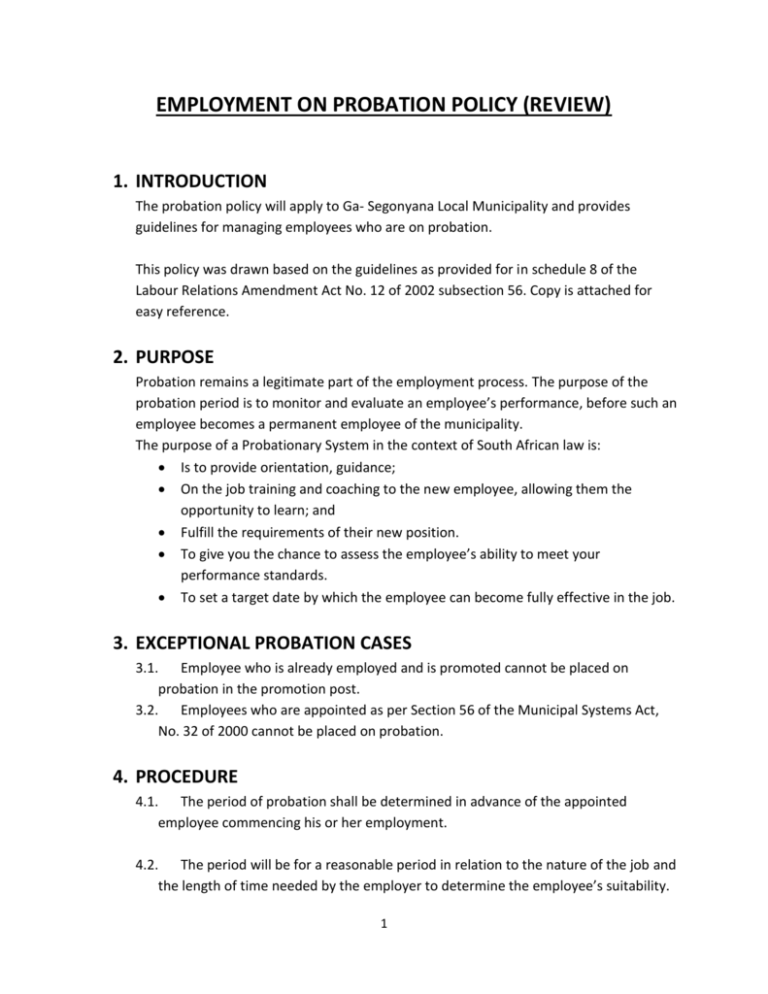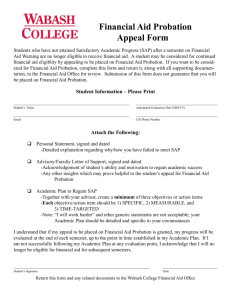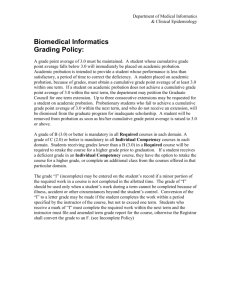employment on probation policy - Ga
advertisement

EMPLOYMENT ON PROBATION POLICY (REVIEW) 1. INTRODUCTION The probation policy will apply to Ga- Segonyana Local Municipality and provides guidelines for managing employees who are on probation. This policy was drawn based on the guidelines as provided for in schedule 8 of the Labour Relations Amendment Act No. 12 of 2002 subsection 56. Copy is attached for easy reference. 2. PURPOSE Probation remains a legitimate part of the employment process. The purpose of the probation period is to monitor and evaluate an employee’s performance, before such an employee becomes a permanent employee of the municipality. The purpose of a Probationary System in the context of South African law is: Is to provide orientation, guidance; On the job training and coaching to the new employee, allowing them the opportunity to learn; and Fulfill the requirements of their new position. To give you the chance to assess the employee’s ability to meet your performance standards. To set a target date by which the employee can become fully effective in the job. 3. EXCEPTIONAL PROBATION CASES 3.1. Employee who is already employed and is promoted cannot be placed on probation in the promotion post. 3.2. Employees who are appointed as per Section 56 of the Municipal Systems Act, No. 32 of 2000 cannot be placed on probation. 4. PROCEDURE 4.1. The period of probation shall be determined in advance of the appointed employee commencing his or her employment. 4.2. The period will be for a reasonable period in relation to the nature of the job and the length of time needed by the employer to determine the employee’s suitability. 1 4.3. The period will not be less than six months and above twelve months. 4.4. The employee’s letter of appointment should explicitly state that he/she will serve a period of probation and must stipulate the period of the probation service. 4.5. The employee must be given a fair opportunity to meet the required performance standards. Therefore it means that an employee that is on probation must at least be aware of the standards of performance he/she is required to achieve and maintain. 4.6. The probationary employee has to receive feedback on his/her performance on a regular basis during the probationary period (forms to be used are attached). 4.7. Proper documentation of discussion or consultation sessions based on the employee’s performance should be availed when recommendation for permanent appointment or dismissal is forwarded to the Council. 4.8. If Council is of the opinion that such employee has successfully completed his/her probationary period, Council shall confirm such employee’s appointment in writing. 4.9. If Council, on or before the date of completion of the probationary period of such employee, is of the opinion that he/she is not fit for the post occupied by him/her, council may: In writing and stating the reasons thereof, extend the probationary period of such employee once only for a fixed period not exceeding six months; or Give such employee at least one working month’s written notice that his/her services will be terminated on a specific date. Provided that a fair procedure has been followed. 2 5. DISMISSAL 5.1. Employee on probation is entitled to the same rights as any other employee in terms of the Labour Relations Act, but however Council after having followed the correct procedures, can terminate the employment of the employee who is on probation if not happy with employee’s performance. 5.2. During the process of dismissal of the employee on probation the following should be considered. 5.2.1. Employee has received appropriate evaluation, instructions, training, guidance or counseling during the period of their probation. 5.2.2. An employee is given an opportunity to make representations prior being dismissed and assisted by a trade union representative or fellow employee. 3



